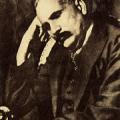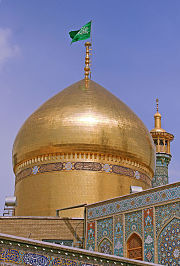194 - Iran So Far: After Ṣadrā
From Sabzawārī in the 19th century to Seyyed Hossein Nasr today, Iranian thinkers promote and respond to the thought of Mullā Ṣadrā.
Themes:
• H. Algar, “Allāma Sayyid Muḥammad Ḥusayn Ṭabāṭabā'ī: Philosopher, Exegete, and Gnostic,” Journal of Islamic Studies 17 (2006), 326-51.
• W. Chittick (ed.), The Essential Seyyed Hossein Nasr (Bloomington: 2007).
• L.E. Hahn, R. E. Auxier and LW. Stone (eds), The Philosophy of Seyyed Hossein Nasr (Chicago: 2001).
• M. Mohaghegh and T. Izutsu, The Metaphysics of Sabzavārī (Delmar NY: 1977).
• R. Pourjavady (ed.), Philosophy in Qajar Iran (Leiden: 2019).
• S. Rizvi, “Hikma mutaʿaliya in Qajar Iran: Locating the Life and Work of Mulla Hadi Sabzawari (d.1289/1873),” Iranian Studies 44 (2011), 473-96.
• S. Rizvi, “‘Only the Imam Knows Best’: the Maktab-e Tafkīk’s Attack on the Legitimacy of Philosophy in Iran,” Journal of the Royal Asiatic Society 22 (2012), 487-503.







Comments
Philosophy in Iran
Hi Peter,
Thanks for this installment. I thoroughly enjoy your work and listen to the weekly episodes quite religiously.
But I hope you can go beyond the Sadra tradition in Iran and explore other philosophers: Like the Young Ottomans and Turks, secular Iranian intellectuals in the 19th and 20th centuries have put forward theories and ideas that are not necessarily influenced by Sadra. I am thinking of Mirza Fath 'Ali Khan Akhundzada, Mirza Aqa Khan Kirmani, Mirza Malkum Khan, Mirza 'Abd al-Rahim Talibuv, and many many more. To pick Sabzivari from among a whole range of other intellectuals in the 19th century seems history with lots of gaps. These intellectuals promoted the first socialist and radical ideas of cultural and political reforms, and established the first "Human/e Societies" of Iran which advocated humanistic values and one secular world religion.
Similarly, in the 19th century we have the birth of two "new" religious traditions in Iran which broke away from Islam completely. The Babi and Baha'i religions developed their own theologies, cultural, religious, and social teachings, and put forward new theories of utopian polities that their respective communities believe in and strive to bring about. Both of these two religions had immediate following from outside of Iran.
Moving beyond the 19th century, in the later 20th century there were figures such as Jalal Al-i Ahmad, 'Ali Shari'ati, Mihdi Bazargan, 'Abd al-Karim Surush, Muhammad Mujtahid-i Shabistari, Murtiza Mutahhari, Ali Murad Davudi, Ramin Jahanbeglou, and many others in between who have been quite influential in other parts of the Islamic world and are fiercely debated in and outside of Iran.
In the broader Shi'ite world, there were of course many more philosophers in Iraq and Lebanon. For example, one of the best Islamic responses written against Marx has been put forward by Muhammad Baqir al-Sadr which I hope you can explore at some point.
I suggest maybe one or two episodes on some of these figures if at all possible.
Best,
Ron
In reply to Philosophy in Iran by Ron
More on 19th-20th century Islamic thought
Yes, I totally agree I could have tried to cover some of the figures you've mentioned, but I'm afraid the die is cast, I've already moved on to writing and recording the Latin medieval episodes. I thought about this quite a lot, I mean how much coverage to give 20th century Islamic thought, and decided that doing it thoroughly ("without any gaps") would just take too many episodes. Even the figures you mention would be another 3 episodes or so, and you haven't mentioned (for instance) some Muslim thinkers of the subcontinent, or further east, or the rise of political Islam, etc. I guess I don't have a really good intellectual justification for stopping where I have, it is more practical considerations (i.e. how long can I tax the patience of people who are waiting for me to return to non-Islamic topics, and how feasible is it for me to tackle material I don't know anything about, also the fact that the book version of these scripts is now already going to be mightly long). On the other hand I do think it makes some sense to focus mostly on figures who engaged with the historical tradition rather than trying to give a synoptic view of 20th century thought, even down to the present - that starts to get into contemporary issues rather than history, some of which of course are highly contentious and not at all within my sphere of expertise. Mostly though it was just a matter of what I felt I could tackle more or less competently.
By the way don't make up your mind about the coverage until you've heard the last episode: next week's interview covers a great deal of ground I didn't discuss in the scripted episodes.
primacy of existence
hi prof. Adamson, enjoyed the podcast. a comment/question about that argument Sabzavari gives for asalatu'l-wujud:
i don't see how it establishes that there is nothing out there in reality but existence. i mean, at most, it shows that causal priority is due to existence, not essence. granted; but how does "therefore, there's only existence out there" follow from that? in fact, even at the end of the relevant passage in the text, Sabzavari seems to say that upholders of asalatu'l-wujud believe that there *is* a priority-posteriority relation among mahiyyaat, but that that relation is explained by existence.
so, it seems that e.g., an Avicennian can consistently hold (a) that causal priority is due to existence and (b) that there are real essences out there in the world, i.e., they aren't merely 'itibaari, i.e., that it isn't just all existence. thoughts?
In reply to primacy of existence by davlat
The Sabzawari argument
Yes, I had some of the same thoughts. I think the argument makes most sense against a diametrically opposed view to the effect that essences are real, but existence is not. If you thought that, then you would be hard pressed to explain what makes one fire prior to another, because in respect of essence the fires are equal. So we should perhaps take him to be arguing only for the concrete reality of existence (to explain causal priority where the cause and effect are the same in essence) rather than to be arguing against the concrete reality of essence. Does that help?
In reply to The Sabzawari argument by Peter Adamson
yes, that helps. i had the
yes, that helps. i had the same thought. in that case, i think the argument, to wax poetic, nicely puts out the Ishraqī fire.
Importance of Sadr
It seems to me that Mullah Sadr might be even more important than Ibn Arabi in influencing Islamic philosophy in the 20th century. Ibn Arabi is often given centre stage by the Perrenialist/Traditionalist movement, but a lot of the ideas they advocate seem to have more direct resonance with Sadr's work. Maybe it's the case that Ibn Arabi is just a more iconic figure, what with his titles of "The Greatest Teacher" and "The Seal of the Saints".
In reply to Importance of Sadr by Ortega
Sadr vs Ibn 'Arabi
Interesting point. I guess it is hard to decide this if only because Sadra himself is so deeply influenced by Ibn 'Arabi, so their impact kind of comes together. Of course Sadra's influence is also largely confined to the shii/Iranian tradition, or was until he became a breakout figure in European scholarship thanks to Nasr and others, and one shouldn't necessarily assume that he has loomed as large in sunni Islamic thought.
Mutahari
Thank you for your hard work, its a great series.
Will you do an episode on Mutahari? He is certainly one of the great modern Islamic philosophers.
In reply to Mutahari by Ahmed
Mutahari
You mean Morteza Mutahhari, yes? If others are curious here is the Wikipedia page on him:
http://en.wikipedia.org/wiki/Morteza_Motahhari
I'm afraid I am not planning to return to 20th century Islamic thinkers at this point, having returned now to the medieval period. There are of course lots and lots of 20th century thinkers I could have tackled - one could in fact do a whole podcast series just on this topic. I really wanted to focus on the reception of the historical tradition rather than getting into contemporary thinkers, and hopefully I got this across to some extent in episodes 192-5.
Shaykhis
Dear Peter,
I think one gap in your wonderful series at present is the one on the Shaykhis, also called 'the Shaykhi School,' and its eponymous leader the philosopher and mystic Shaykh Aḥmad al-Aḥsāʾī (d.1241/1826). Shaykh Aḥmad hailed from the al-Ahsāʾ region in Saudi Arabia, and widely traveled in the Shīʿa centers of learning in Iraq and Iran, eventually settling in Qajar Iran for a large part of his life. His invoative philosphical teachings and writings, included philosophical commantaries on Mullā Sadrā’s (d. 1050/1640) Kitāb al-mashā'ir ("The Book of Penetrasions"), and al-Ḥikmat al-ʿarshiyah ("The Wisdom of the Throne"). He accepted Mullā Sadrā's breakthrough of existential or substantial motion, but radicalized it by a thorough process philosophy which bears similarities with Whitehead among others.
Best wishes,
Farshid
In reply to Shaykhis by Farshid Kazemi
Ahsai
Hi there - thanks for the suggestion. It's not entirely true that I skipped him, I mentioned Ahsai very briefly in episode 194, favoring Sabzawari instead in looking at 19th c. reactions to Sadra (I really only mention Ahsai in one sentence or so as a critic of Sadra). But you're right that he probably deserved a bit more attention! I'll try to add a bit more about him for the book version.
Transliteration?
How do you transliterate/spell itibaari? I'm trying to find any reference to it online, but I can't.
In reply to Transliteration? by Raphael
Transliteration
It's iʿtibārī. That second letter that looks like an apostrophe is an 'ayn, pronounced like a glottal stop.
South East Asia
Hi Peter, great episode!
Great to hear South East Asia (Indonesia) get a mention, which has been conspicuous by its absence seeing as how Indonesia has the world's largest population of Muslims.
Which made me wonder though, does Indonesia or Malaysia have its own Islamic philosophical tradition? I've looked in a number of general introductions to Islamic philosophy but could only find a brief mention in one of Majid Fakhry's books.
Thanks again and keep up the good work!
In reply to South East Asia by Hussain
Southeast Asia
Yes, for sure there is recent philosophy in Indonesia. Actually a colleague of mine at King's College London has worked on this, his name is Carool Kersten, so you could google him and read up on some of his publications.
Interview
Hey Peter, Thanks for the nice episode, as always. What about an interview with Nasr?
In reply to Interview by Xaratustra
Nasr
I've never even met him, actually! In any case interviewing him now would be about 80 episodes too late... see under FAQ below, I don't backtrack to material I already covered. Glad you liked this episode though!
In reply to Nasr by Peter Adamson
Otterlex
And now it is even more episodes too late. But i think, if for some reason you got offered to interview him, it would make for a great bonus episode (it would probably fit best in the bonus episodes section at this point if things happened to align in a way that it happened). If in 9+ years, you get to contemporary western philosophy, are you going to offer to interview the people you are covering?
In reply to Otterlex by Alexander Johnson
Interviewing the living
To be honest I never thought about that before! I guess I have some time to mull it over though.
Allāma Hassan Zadeh Amoli
Dear Peter,
Nasr and Corbin have done an amazing work to expose the Islamic philosophy of Shii'te world to western world. However, as the narative alludes to, they may not, by no means, be considered as where this tradition is currently at; not even close. As you know most of great Islamic philosphers and mystics, had that special pupil with whom they had private exchange sessions. Allama Tabatabaei had those private sessions with Allama HassanZadeh Amoli for 16 years;one-on-one. This is no secret to hard-core Sadra tradition philosophers currently in Iran that he is the utmost and most distinctive heir of not only Sadra tradition but also of Ibn Arabi and the like. He has authored myriads of books and 'risalah' on philosophy, science, astronomy etc and not being mentioned in your great book is a very unfortunate gap.
I have other comments about Sabzawari and existence which I get to later. :)
Thanks for the great work.
Decline in the islamic world
Hi Peter! I have been listning to your podcast with enormous enjoyment for the last two years or so :) I have been especially glad about this part about philosophy in the islamic world, and happy to learn that the usual story about the decline of philosophy in this part of the world is a myth.
However, I can't help noticing that you are able to cover the period after 1200 and up to today in 30 episodes or so. As the rest of your podcast already shows, it would be impossible to cover European post-1200 philosophy (with equal thoroughness) in so few episodes: probably, it is going to take you several hundreds of episodes to get from, say, Hildegard of Bingen and all the way up to, say, Jürgen Habermas, or even just Kant. I accept your basic point that philosophy didn't die off among muslims in the islamic world after Averroes, there was a somewhat thriving and continuous philosophical tradition. However, judging from the amount of post-Averroes islamic philosophy featured in the podcast, this tradition seems tiny compared to European tradition.
So why is that? Is it because philosophy after all didn't thrive as much in the Islamic world as in Europe after the middle ages? Or is it due to lost manuscripts etc. in the Islamic world - so that there was an equally thriving tradition in the east, but it is now lost? Or is the cause lack of research in the area - so that we just don't know enough to make hundreds of podcast episodes about later philosophical developments? Or some sort of combination of the above?
I'm looking forward to starting listening to the installment about medieval philosophy. Keep up the good work!
In reply to Decline in the islamic world by Jon Egeris Karstoft
1000 years in 30 episodes
Yes, that's a good point. The explanation is the last one you mention: lack of research on which I could draw. If anything there is too much material to deal with: literally thousands of manuscripts that have been unstudied. No doubt someone from the Islamic world, who is better steeped in this tradition than I am, could have dealt with it in more detail. But I expect (and hope) that in 20-30 years people look back on my handling of the topic in the podcast and book and sees it as hopelessly outdated, because it was written when so little was known, at least in European language scholarship.
In reply to Decline in the islamic world by Jon Egeris Karstoft
Islam
It is only a superficial perspective is it not that there has been no intellectual decline in the Islamic world? How does a cummunity leading the world in intellectual thought end up with half of its people being totally illiterate without referencing decline in thought? Sometimes people look too much into the chaotic details and lose the sight of the whole. How is the said decline a myth when in the last 1000 years fewer books have been translated in the whole of Muslim world than a small country such as Spain, not to mention original thinking?
small question
Hello,
we can not see the text of this episode?
thank you.
In reply to small question by Ali
Text
A revised version came out in the third volume of the book series based on the podcast, "Philosophy in the Islamic World."
https://global.oup.com/academic/content/series/h/a-history-of-philosoph…;
No mention of Babi and Baha'i influences?
How can one discuss 19th Century Qajar Iran without even a mention of the convulsive impact of Sayyed ʻAlí Muḥammad Shírází (the Bab) and later Baháʼu'lláh. Despite attempts to sanitize any reference to this perceived heresy by the current Islamic Republic, still a huge part of 19th and 20th century Iranian philosophy represents a response, either refutation or embracing aspects of the teachings of this faith. These teachings bear on the emancipation of women, a perennial or universalist view of religion embracing Hindu, Zoroastrian and other non-abrahamic based religions and universal education among many other challenging positions.
Add new comment